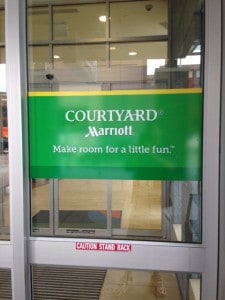 Many companies have brand promises that look good in ads, and emblazoned on websites, banners and buttons, but often these promises have little credibility among customers or employees. They are simply a set of words brainstormed at an ad agency that usually promise more than employees are prepared to deliver, and result in less than customers expect to receive.
Many companies have brand promises that look good in ads, and emblazoned on websites, banners and buttons, but often these promises have little credibility among customers or employees. They are simply a set of words brainstormed at an ad agency that usually promise more than employees are prepared to deliver, and result in less than customers expect to receive.
Take, for instance, my recent stay at a Courtyard Hotel in Lincoln, Nebraska. (Full disclosure: I worked for Marriott International for 20 years.) I passed a half-dozen signs on the way into the hotel that read: Make room for a little fun.™ And a quick peek at the @CourtyardHotels Twitter page revealed the phrase: “Put more play in your stay” along with the hashtag: #BringTheFun. With all this talk about fun, I was sure that my family and I were going to enjoy this hotel!
On the second night of our stay, after a long day of sightseeing and visiting relatives in Pender, Nebraska (100 miles north of Lincoln), we returned to the hotel and ordered in Valentino’s Pizza (a local favorite). As I waited in the lobby for the pizzas to arrive, my wife and four young children changed into their swimsuits. The kids were giddy at the thought of Valentino’s Pizza and playing in the hotel’s swimming pool. We were planning to #BringTheFun!
When I arrived with the pizzas, the kids were already in the pool “putting more play in their stay.” As I set out paper plates and napkins on the two available tables, the kids began to emerge from the pool, towel off, and sit down for a hot slice of pizza. Sure, we could have eaten the pizzas in our hotel room but we were “making room for a little fun!”
 About this time, a security officer entered the pool area and said, “I hate to be a wet blanket, but there’s no food allowed in the pool area.”
About this time, a security officer entered the pool area and said, “I hate to be a wet blanket, but there’s no food allowed in the pool area.”
I said, “Seriously?” (I was genuinely surprised by the contradiction between the hotel’s brand promise and the reality that I was experiencing. While I was attempting to “put more play in my stay” and #BringTheFun with my family, the security officer, citing hotel policy, asked me to pack up our pizzas and eat them elsewhere.)
Incidentally, if I advised this hotel, I would caution each associate (Marriott’s term for its employees) that if you find yourself prefacing guest communication with, “I hate to be a wet blanket…” then you had better scrutinize the policy or process in question to ensure that it’s consistent with your brand promise. And I’m pretty sure that, from the guest’s perspective, being a wet blanket aligns with #SpoilTheFun, not #BringTheFun.
That said, I don’t blame the security guard for enforcing hotel policy. That’s his job. (And there are plenty of valid policies to enforce in any hotel: particularly those dealing with legal, ethical, financial, and safety considerations.) I do, however, challenge the thinking behind a policy that doesn’t allow family members to enjoy a slice of pizza at one of the tables in the pool area. When I brought this to the attention of the front desk agent who inquired about my stay during check-out the following morning, she said, “I can see the contradiction between (our brand promise) and your experience at the pool.”
Unfortunately, many companies trumpet brand promises that have little to do with customers’ actual experiences with the brand. These companies have a choice: either revise their brands’ promise or amend the policies and processes that contradict the promise. Otherwise, they will be promising more than employees are prepared to deliver and providing less than customers expect to receive.



